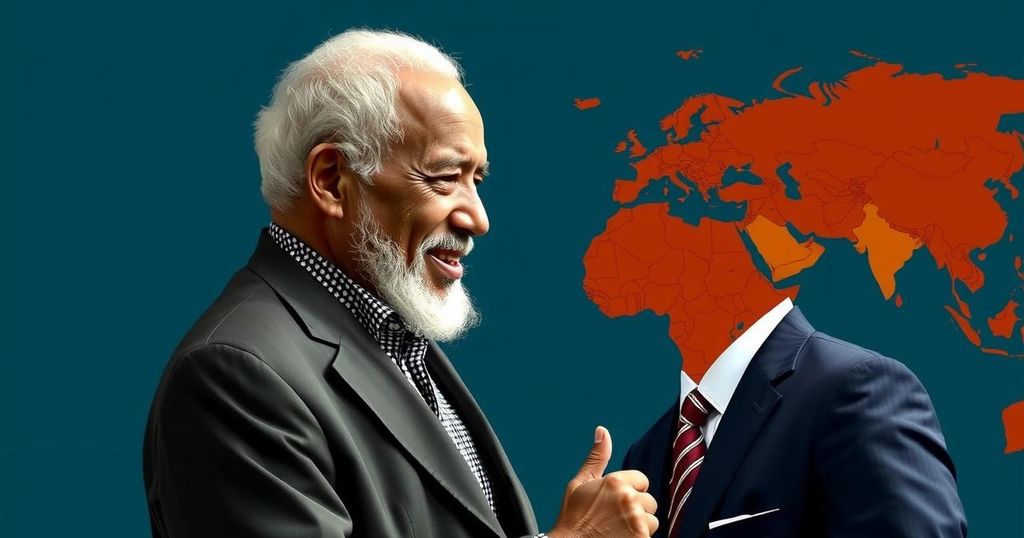President Joe Biden’s trip to Angola aims to spotlight a U.S.-funded railway project designed to redirect critical minerals away from China. The Lobito Atlantic Railway project connects the DRC and Zambia to the Angolan port, promoting efficient exports to the West amidst growing Chinese dominance. This visit reflects a strategic U.S. engagement with Africa, although the effectiveness and timeline of the project raise concerns.
President Joe Biden is embarking on an important trip to Angola, commencing on Sunday, which fulfills his commitment to engage with Africa during his presidency. This visit will highlight a significant U.S.-supported railway initiative designed to redirect essential minerals from China. The project, which is partially financed by a U.S. loan, aims to connect the mineral-rich Democratic Republic of Congo (DRC) and Zambia with the Angolan port of Lobito, thus creating a more efficient export route to western markets.
At the heart of this initiative are critical minerals such as cobalt and copper, prevalent in the DRC, essential for the production of batteries and electronic devices. China’s dominance in the DRC has raised concerns within the U.S., especially following a recent deal China made with Tanzania and Zambia to enhance another railway that connects to Africa’s eastern coast. Meanwhile, Biden’s visit occurs as Donald Trump is poised to return to the White House, potentially positioning him to support the railway project and maintain strong relations with Angola, according to former officials from the Trump administration.
One notable concern that Trump is expected to prioritize pertains to the growing influence of China and Russia in Africa, alongside the quest for critical minerals. Tibor Nagy, a former ambassador to Africa, noted, “This checks both boxes,” referring to the Lobito Atlantic Railway (LAR). Supported by global commodities firm Trafigura and the Portuguese construction company Mota-Engil, the U.S. Development Finance Corporation has allocated a $550 million loan to revamp the 1,300-kilometer rail network covering Lobito to the DRC.
Biden’s agenda includes brief stops in Cape Verde before continuing to Angola, where he plans to visit significant historical sites, including a museum dedicated to slavery. This trip represents a portion of a broader commitment to enhance American engagement in Africa, though several pledges, such as supporting permanent U.N. Security Council seats for African countries, remain unfulfilled.
Moreover, the U.S. appears to have made limited progress in facilitating access to Africa’s mineral wealth for national security purposes, alongside enduring diplomatic challenges. For instance, the U.S. lost a significant spy base location in Niger this summer, contributing to an absence of military presence in the Sahel, a region troubled by Islamist activities. Although Angola has historically maintained strong ties with China and Russia, recent developments show a willingness to partner with any entity that can help stimulate economic growth.
Angola’s transport minister stated, “China has only gained prominence because Western countries have probably not been paying much attention to Africa.” Biden’s visit marks a significant shift in the evolving relationship between the United States and Angola, a journey characterized by a complicated past involving U.S. and Soviet backing of opposing sides in Angola’s lengthy civil conflict.
Biden administration officials view the Lobito railway as a model for future public-private partnerships in Africa, envisioning it as a precursor to larger infrastructure advancements. However, there are concerns about whether the project will meet its objectives, especially as plans for further phases to connect to eastern ports may extend timelines unpredictably.
Former adviser Judd Devermont emphasized that it is crucial for the DRC to not solely rely on Chinese partnerships, reiterating the utility of a well-connected mining sector across the continent. “The Congolese have been very clear that they don’t want to see their entire mining sector dominated by China,” he stated. Furthermore, ensuring flexibility in transporting essential goods effectively benefits multiple stakeholders across the globe.
This article discusses President Joe Biden’s imminent trip to Angola, emphasizing its significance in reinforcing U.S.-Africa relations amidst growing Chinese influence on the continent. With the backdrop of essential mineral extraction and emerging infrastructure projects, the trip symbolizes a strategic approach to combat rival powers while nurturing partnerships vital for economic development. Historically, Angola’s relations with both the U.S. and China are complex, marked by periods of cooperation and competition. This visit is part of a larger initiative to enhance U.S. engagement in Africa and address pressing geopolitical concerns.
In conclusion, President Biden’s forthcoming visit to Angola underscores the United States’ commitment to strengthening ties with Africa and addressing the growing influence of China within the continent. The Lobito rail project not only aims to enhance economic opportunities by improving access to vital mineral exports, but it also serves as a test case for future collaborative infrastructure endeavors. However, challenges remain, particularly regarding the timeline for these projects and their capacity to meet strategic U.S. interests in the region, particularly in light of historical tensions and the dynamic geopolitical landscape.
Original Source: www.usnews.com







